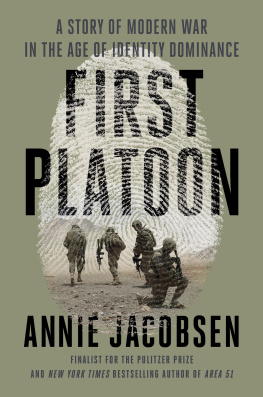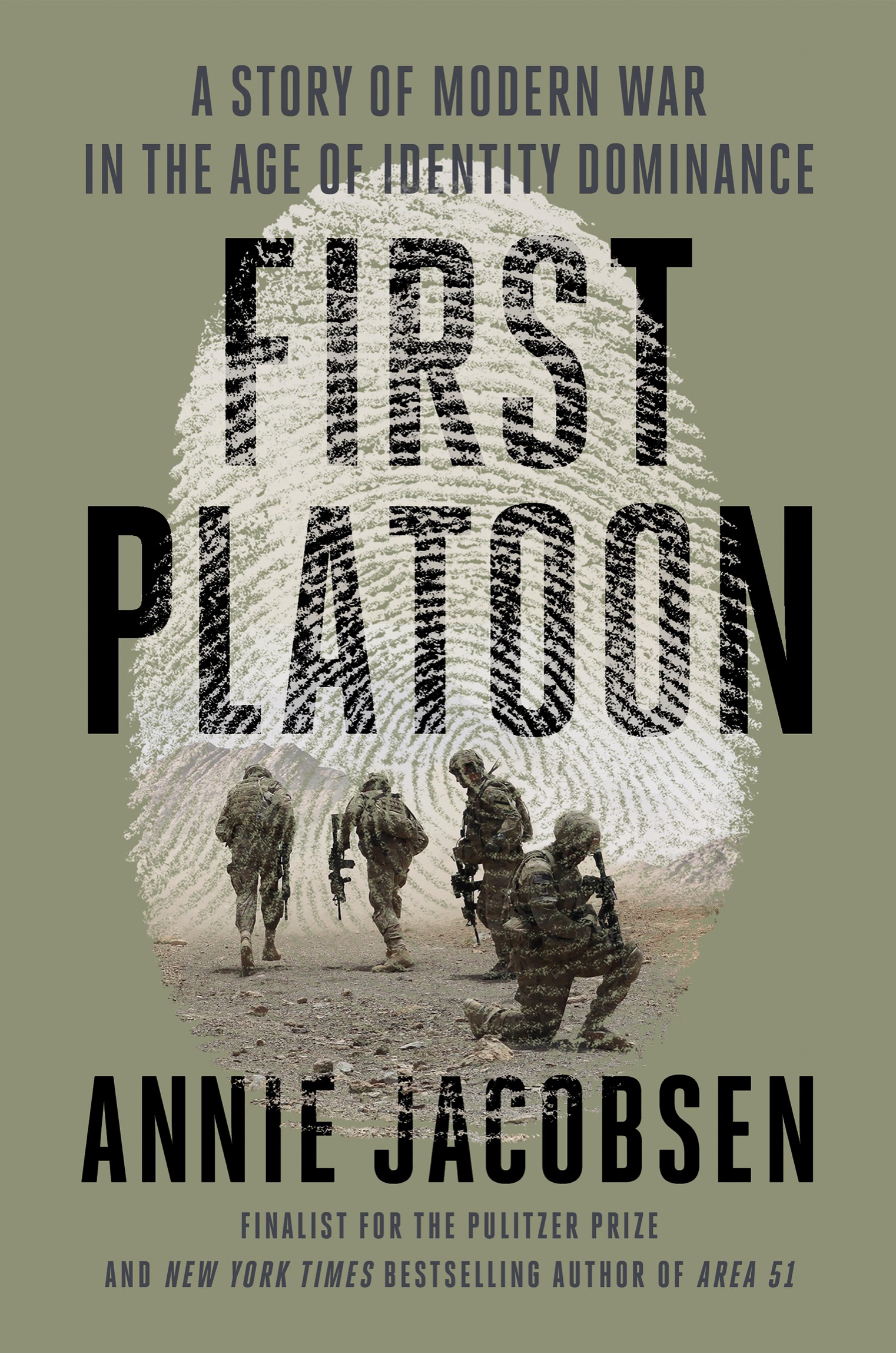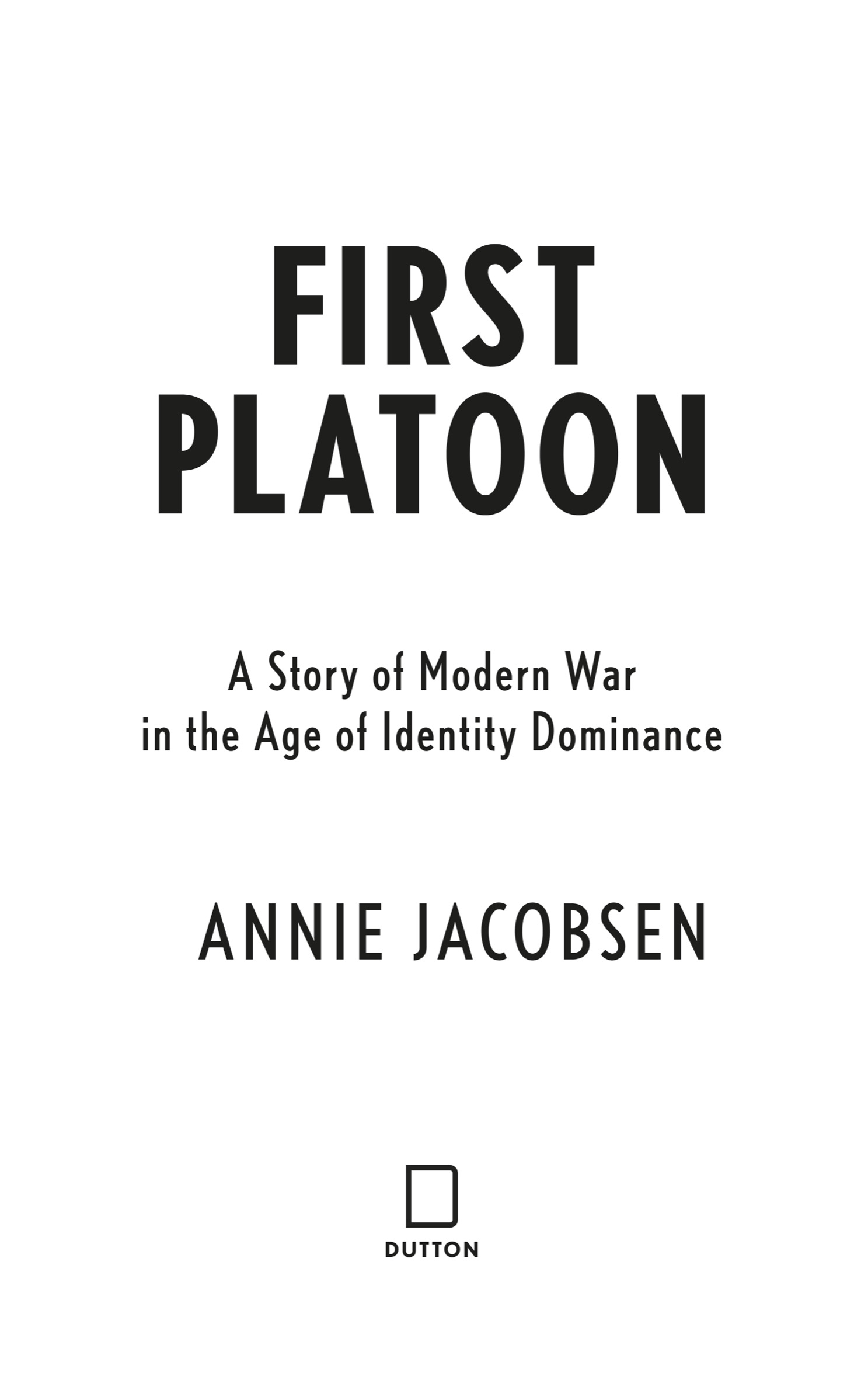Also by Annie Jacobsen
Area 51
Operation Paperclip
The Pentagons Brain
Phenomena
Surprise, Kill, Vanish

Dutton
An imprint of Penguin Random House LLC
penguinrandomhouse.com

Copyright 2021 by Anne M. Jacobsen
Penguin supports copyright. Copyright fuels creativity, encourages diverse voices, promotes free speech, and creates a vibrant culture. Thank you for buying an authorized edition of this book and for complying with copyright laws by not reproducing, scanning, or distributing any part of it in any form without permission. You are supporting writers and allowing Penguin to continue to publish books for every reader.
DUTTON and the D colophon are registered trademarks of Penguin Random House LLC.
library of congress cataloging-in-publication data
Names: Jacobsen, Annie, author.
Title: First platoon : a story of modern war in the age of identity dominance / Annie Jacobsen.
Other titles: Story of modern war in the age of identity dominance
Description: New York : Dutton, [2021] | Includes bibliographical references and index.
Identifiers: LCCN 2020039784 (print) | LCCN 2020039785 (ebook) | ISBN 9781524746667 (hardcover) | ISBN 9781524746681 (ebook)
Subjects: LCSH: Afghan War, 2001Military intelligenceCase studies. | Biometric identificationUnited States. | TerroristsIdentification. | United States. Army. Cavalry Regiment, 73rd. Squadron, 4th. | Military intelligenceUnited States. | United States. ArmyStability operationsHistory21st century.
Classification: LCC DS371.412 .J33 2021 (print) | LCC DS371.412 (ebook) | DDC 958.104/78dc23
LC record available at https://lccn.loc.gov/2020039784
LC ebook record available at https://lccn.loc.gov/2020039785
While the author has made every effort to provide accurate telephone numbers, internet addresses, and other contact information at the time of publication, neither the publisher nor the author assumes any responsibility for errors or for changes that occur after publication. Further, the publisher does not have any control over and does not assume any responsibility for author or third-party websites or their content.
Cover Photograph GETTY IMAGES
pid_prh_5.6.1_c0_r0
For Kevin
Laws are as fair as a spiders webs.
A sparrow will fly through them, but a fly will die.
Jan Kochanowski
CONTENTS
PART I
CHAPTER ONE
THE PANOPTICON
In the summer of 2012, a group of young men, who at the time were American soldiers, found themselves in one of the most dangerous and treacherous places in the world. Thinking they were on one kind of mission, they really were unwittingly part of something much bigger and, perhaps, even nefarious. It was June 4, 2012, and there, on the northern slope of the Arghandab River in Zhari District, Afghanistan, in the village of Payenzai, the soldiers from First Platoon, Charlie Troop, 4/73rd Cavalry Regiment, 4th Brigade Combat Team, 82nd Airborne Division, were getting ready to head into battle, as millions of soldiers had before them, in countless wars across thousands of years. Private 1st Class Samuel Walley remembers the day indelibly, because it was his birthday, and only once in a persons lifetime do you turn twenty years old.
We captured the number two most wanted Taliban in [the] South, Walley recalled. And though time and priority have diluted the significance of this most-wanted catch, it was important for a number of reasons. We captured him, said Walley, by getting his fingerprints.
Private Walley grew up in Georgia on four acres of land, climbing trees and jumping in rivers. His family was military stock. He was raised to be rugged. Turn problems into solutions. In the second grade, he developed a lisp and other kids made fun of him. He willed what was wrong with him away by speaking with a British accent, like James Bond. Now he was twenty years old, six foot, one inch tall. He had green eyes, sandy-brown hair, and weighed 185 pounds. He was fit; he ran a six-minute mile and bench-pressed 240 pounds. Sit-ups were his weakness. He had two atomic bombs tattooed on his left arm with the word Chaos written beside them, a nickname from what felt like forever ago but was only last year: high school. His platoon, First Platoon, had been in southern Afghanistan for a little more than three months. Today, Walley carried the biggest weapon on first squad, the M249 Squad Automatic Weapon, a belt-fed killing machine capable of firing 900 rounds per minute. He checked and rechecked his gear. Everyone was ready. It was time to go.
The soldiers lined up in a staggered file formation, originally designed for road marches but adapted for goat paths and grape rows in southern Afghanistan. It was baking hot. Already more than 100 degrees. One of the Afghan National Army soldiers opened Strong Point Payenzais plywood gate and out the American soldiers went, one after the other, leaving the zigzagged entry control point spaced ten feet apart. The soldiers headed east, then north, into Sarenzai Village, a community of mud-brick buildings and labyrinthine walls located roughly two football fields from the strongpoint. They knew the village well. They patrolled the terrain here two times every day, five or more hours at a time, or until something went wrong.
Payenzai and everything around it was a hellhole, Walley remembered.
Life here resembled existence after an apocalypse. Decades of war had left Zhari District in a state of collapse. Anarchy and terror had long since vanquished the rule of law. The villagers here had no electricity, no running water, no shops or food stores of any kind. Mud-brick buildings bombed-out and long abandoned, remembered company commander Captain Patrick Swanson. No fertile fields, no marketplace, no schools.
Our minds are darkwe dont know anything, and our children cant even write their names, district governor Niyaz Mohammed Sarhadi told the State Departments Jonathan Addleton in 2012.
At the Pentagon, war strategists called life here simple and Hobbesiannasty, brutish and short. State Department estimates put the villagers life expectancy at forty-four. It was understood by everyone in the American chain of command that the area around Strong Point Payenzai was ruled by a network of Taliban insurgents and that improvised explosive devices, or IEDs, were sewn into the terraininto the roads and pathways and farmers fields. Insurgents stockpiled homemade explosives in the abandoned compounds across this area of operations (AO) and recruited new members from among local villagers. Assassinations and murders were commonplace. In 2012, bomb production was on the rise. The Taliban ran IED assembly and distribution across the terrain. The buildings reduced to rubble around here served as bed-down locations for fighters coming in from Pakistan, trafficking weapons and materiel to make more bombs.
After more than a decade of losing this war, in more ways than it could count, the Defense Department believed it had found a technology-based solution to the human problem of insurgency. All across Afghanistan, U.S. military forces were capturing biometric data: electronic fingerprints, iris scans, facial images, and where possible, cell swabs of DNA. The Pentagon believed that through mass biometric collection, it could bring the rule of law to this land where insurgents reigned. The effort was called Identity Dominance. The product was biometrics-enabled intelligence. The battlefield component of this data-driven mission fell to combat infantry soldiers in the field. One member of the platoon, the Company Intelligence Support Team member, the COIST, handled technical collection. The rest of the platoon supported the COISTs efforts with varying degrees of military presence and force.















